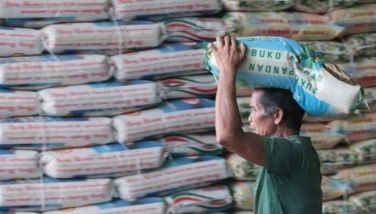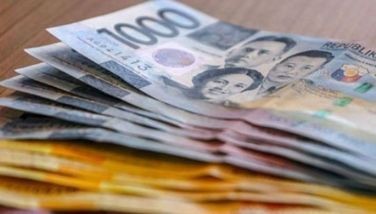Export decline eases in October
December 5, 2001 | 12:00am
The decline in Philippine exports eased in October despite uncertainties over the economic impact of the Sept. 11 attacks on the United States, and analysts were cautiously optimistic the worst of the downturn is past.
The National Statistics Office (NSO) announced yesterday that exports reached $2.939 billion in October, down 13.5 percent from $3.398 billion in the same month last year.
The decline on the year was the smallest since May, when exports fell by 11.4 percent.
"October exports reflect a regional trend towards a slowing rate of decline," said Arjuna Mahendran, an analyst at 4CAST.
"The jury, is out, however, on whether this reflects a one-off blip upwards in demand for electronics goods in the aftermath of Sept. 11 (the suicide air attacks on the United States) and a temporary shift of consumers away from travel-related expenditure towards consumer electronics, " Mahendran added.
Trade and Industry Secretary Manuel Roxas II said he expects the country’s export performance to improve by the third quarter of next year following the expected rebound of the global economy.
"Until then, the task ahead is for us to tighten our belts while also making sure that our manufacturing sector, our exporters, will be ready to take advantage of the rebound of the global economy when it comes," he said.
Roxas pointed out that domestic demand continued to help the economy ride out the difficulties and that there are new indications of increased consumer demand and retail sales picking up in the US.
In the first 10 months of the year, exports fell to $26.873 billion, down 14 percent from $31.265 billion in the corresponding period last year.
Officials have forecast a contraction in exports of as much as 15 percent for the whole of 2001 over last year due to the slowdown in the United States and Japan, the largest markets for Philippine products.
The Philippines has also been affected by the global slump in demand for semiconductors and electronic components, the country’s main exports.
"I think you will still see double digit declines for a while, for the balance of the year for instance and maybe even into the early part of next year, because the very nature of the Philippines’ exports is that it is electronics-driven and we are not seeing a pickup as of yet in the end-markets," said Jojo Gonzalez, head of research at Philippine Equity Partners.
"It is too early to call the bottom or recovery for exports. Maybe the bottom is not too far off, but the recovery is certainly a bit off still."
Electronics components, accounting for a little over half of the total export revenue, declined by 26 percent in October to $1.515 billion from $2.048 billion in October last year. The fall was also the smallest since May 2001 when it posted a drop of 21.8 percent on the year.
While the apparent halt in export decline was encouraging, economists pointed out domestic demand was now the main driver for the Philippine economy.
"I think you do have to keep that in mind that exports are important, but they are not the only engine for growth in those countries which can spur domestic demand," said Graham Parry, an economist at Lehman Brothers in Tokyo.
"They are the ones weathering the storm the best in Asia and the Philippines looks like it has been able to do that."
The Philippine economy grew by a slightly better than forecast 2.9 percent in the third quarter, backed by strong domestic consumption growth and good farm sector growth.
The government has said it was on track to meet a full-year gross domestic product (GDP) growth target of 3.3 percent.
Parry said there were some indications the cyclical downturn in the electronics industry may be ending soon, but also warned any pick-up in demand in the United States would be a couple of quarters away.
"I don’t think there are any prospects of a sharp pick-up in external demand, but we have probably seen the worst of things (on the export front for the Philippines). We’ll probably stay weak for a while a little longer, then improve slowly." – Marianne Go
The National Statistics Office (NSO) announced yesterday that exports reached $2.939 billion in October, down 13.5 percent from $3.398 billion in the same month last year.
The decline on the year was the smallest since May, when exports fell by 11.4 percent.
"October exports reflect a regional trend towards a slowing rate of decline," said Arjuna Mahendran, an analyst at 4CAST.
"The jury, is out, however, on whether this reflects a one-off blip upwards in demand for electronics goods in the aftermath of Sept. 11 (the suicide air attacks on the United States) and a temporary shift of consumers away from travel-related expenditure towards consumer electronics, " Mahendran added.
Trade and Industry Secretary Manuel Roxas II said he expects the country’s export performance to improve by the third quarter of next year following the expected rebound of the global economy.
"Until then, the task ahead is for us to tighten our belts while also making sure that our manufacturing sector, our exporters, will be ready to take advantage of the rebound of the global economy when it comes," he said.
Roxas pointed out that domestic demand continued to help the economy ride out the difficulties and that there are new indications of increased consumer demand and retail sales picking up in the US.
In the first 10 months of the year, exports fell to $26.873 billion, down 14 percent from $31.265 billion in the corresponding period last year.
Officials have forecast a contraction in exports of as much as 15 percent for the whole of 2001 over last year due to the slowdown in the United States and Japan, the largest markets for Philippine products.
The Philippines has also been affected by the global slump in demand for semiconductors and electronic components, the country’s main exports.
"I think you will still see double digit declines for a while, for the balance of the year for instance and maybe even into the early part of next year, because the very nature of the Philippines’ exports is that it is electronics-driven and we are not seeing a pickup as of yet in the end-markets," said Jojo Gonzalez, head of research at Philippine Equity Partners.
"It is too early to call the bottom or recovery for exports. Maybe the bottom is not too far off, but the recovery is certainly a bit off still."
Electronics components, accounting for a little over half of the total export revenue, declined by 26 percent in October to $1.515 billion from $2.048 billion in October last year. The fall was also the smallest since May 2001 when it posted a drop of 21.8 percent on the year.
While the apparent halt in export decline was encouraging, economists pointed out domestic demand was now the main driver for the Philippine economy.
"I think you do have to keep that in mind that exports are important, but they are not the only engine for growth in those countries which can spur domestic demand," said Graham Parry, an economist at Lehman Brothers in Tokyo.
"They are the ones weathering the storm the best in Asia and the Philippines looks like it has been able to do that."
The Philippine economy grew by a slightly better than forecast 2.9 percent in the third quarter, backed by strong domestic consumption growth and good farm sector growth.
The government has said it was on track to meet a full-year gross domestic product (GDP) growth target of 3.3 percent.
Parry said there were some indications the cyclical downturn in the electronics industry may be ending soon, but also warned any pick-up in demand in the United States would be a couple of quarters away.
"I don’t think there are any prospects of a sharp pick-up in external demand, but we have probably seen the worst of things (on the export front for the Philippines). We’ll probably stay weak for a while a little longer, then improve slowly." – Marianne Go
BrandSpace Articles
<
>
- Latest
- Trending
Trending
Latest





























